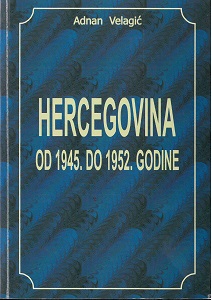
We kindly inform you that, as long as the subject affiliation of our 300.000+ articles is in progress, you might get unsufficient or no results on your third level or second level search. In this case, please broaden your search criteria.

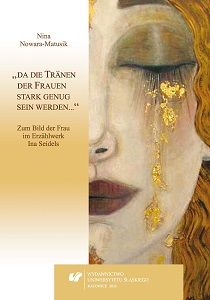
The literary works of Ina Seidel, the author of one of the best-selling books in the history of German literature, the novel “Das Wunschkind”, are slowly sinking into oblivion. Called „Ernst Jünger in a skirt”, the writer did not hide her sympathies for the fascist ideology, which also echoes in her works. Not surprisingly, in previous literary studies, her writings were perceived, as a rule, through the prism of criticism of ideology and situated in the context of the literature of the Nazi Germany. // However, the starting point for our dissertation is different. Shifting the research paradigm, in the theoretical part the author sums up the gender theories existing at the time of the Weimar Republic, which was also the period when most Ina Seidel’s texts were written, texts to which the main body of this dissertaion is devoted. These theories constitute a conceptual foil for the analyses conducted in its further part. The concepts discussed are founded on the model of differentiality. The author alludes to the matriarchy theory by the Swiss anthropologist Johann Jakob Bachofen, the notions of feminity and masculinity by the German sociologist Georg Simmel and views on a woman’s role in society from leading representatives of a moderate wing of the feminist movement in Germany – Helena Lange and Gertrude Bäumer. // The analytical part of the dissertation carries an argument focused on the women characters created by Seidel. They are protagonists of both the foreground and the background, representing various types of womanhood: mothers, wives, single women, femme fatales, artists, women professionals and scholars. By way of these, Ina Seidel explores some of her central topics related to being a woman: maternity, childlessness, moral mission of a woman and her role in society. The close reading of her novels leads to the conclusion that the writer applies a specific aesthetic of a „squinting look”. The German literary critic Sigrid Weigel uses this metaphor in reference to the writings of women who, accepting the traditional patriarchal models of gender and moving within the frame of these, simultaneously search for the ways to articulate their own, specifically feminine experiences. On the one hand, Ina Seidel’s narration follows the conservative model of thinking about a woman, typical of her times, in which the superior category is motherhood. On the other hand, however, it indicates that, paradoxically, it is motherhood that can become a woman’s weapon and a starting point for her emancipation.
More...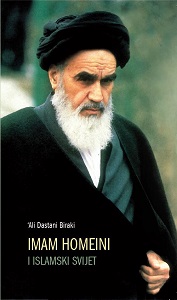
In the vision of Imam Khomeini, r. a., Islam is a world religion that spreads the shadow of its grace over all parts and regions of the world. The Imam’s ideas and words, inspired by the Qur’an, hadith, and sublime Islamic teachings, are life-giving teachings whose primary task is to meet the needs of society, solve social problems, and ensure worldly and otherworldly happiness for peoples. With his broad insight, Imam Khomeini considers the problems of all Islamic societies a common and unique pain, for the elimination of which we must act jointly and comprehensively. He is convinced that the backwardness of Islamic countries in economic, technological, social and cultural terms stems from the old concept of imperialism and colonialism, and cannot be overcome except by a divine movement aimed at awakening and raising awareness of all Muslims, Shiites or Sunnis. (text by the editors)
More...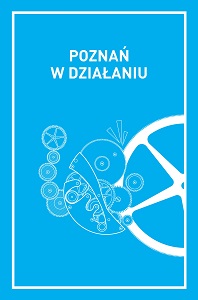
The book Poznań in Action: Social Initiatives, Past and Present presents grassroots initiatives and the tradition of “organic work” that arose in Poznań, from the birth of the idea of organic work in the nineteenth century, to contemporary actions taken by Poznanians. The publication is a record of specific actions taken by the residents of Poznań (and Wielkopolska) to promote the values they cherished. It is a testament to belief in the ability to express one’s opinion in the public sphere, and to the agency of various social groups which expressed their disagreement with the status quo or sought to achieve social objectives that were important to them. It reflects the struggles and hardships resulting from social engagement, but also the successes and benefits achieved by means of such activity.The book consists of three main parts. The first – Past Actions – recalls the history of social initiatives in Poznań and Wielkopolska. In three chapters, writers discuss topics related to “organic work” in the nineteenth century and the continuation of grassroots action in the interwar period and in the Polish People's Republic. The articles that comprise this part also reflect critically on efforts to continue the ideas of organic work in the twentieth century.The second part of the book, entitled Actions Today, consists of four articles discussing the grassroots initiatives and self-organization efforts initiated by Poznanians after the political transformations of 1989. These texts concern various spheres of social and cultural life in modern-day Poznań. Some articles consider historical contexts, while others describe events in the recent history of the city that were important for particular initiatives. This section opens with an extensive article about Poznań’s urban movements and civic organizations. There are also articles on ecology, Poznań’s alternative theatres and the crisis in the sphere of cultural activities in Poznań.The third part of the book, The Current Polylogue, contains interviews that complement the map of grassroots actions in Poznań over the last quarter century. It opens with a conversation on Poznań’s anarchist movement. The next piece deals with housing issues, including the tenants’ movement and the problem of evictions. There are also discussions with Poznań feminists, showing the history, contemporary state, and multidimensionality of feminist initiatives in Poznań. Another important issue taken up in this section concerns assistance provided to migrants and their integration into the Poznań community. The final interview presents the ideas behind the Hipolit Cegielski Society and the grassroots actions it has carried out drawing specifically on the tradition of organic work in Poznań.The last part of the book is a Handbook designed as a practical guide meant to encourage action and organising on the part of all those who want to effect changes that are important to them and are ready to do something about it. Those looking for specific information will learn step-by-step how to set up a cooperative and create the social structures needed for self-organization.
More...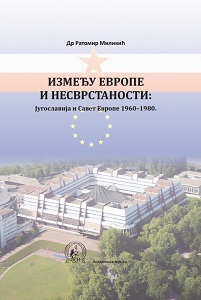
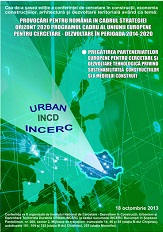
Sixth international edition of the research conference on civil engineering, economy of constructions, architecture, urban planning and territorial development. Abstract Proceedings Includes abstracts of the papers presented in the research conference on constructions, economy of constructions, architecture, urbanism and territorial development, 6th edition.
More...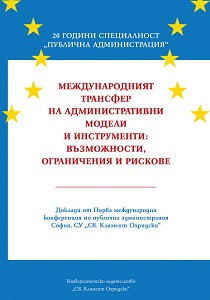
What thoughts the following theme does evoke – “International transfer of administrative models and instruments: opportunities, constraints and risks?” It became an object of “love at first sight” for me immediately after it was proposed as a unifying “crown” of the international scientific conference on the occasion of the 20th anniversary of Sofia University’s Department of Public Administration. What broader content could be set which nevertheless presupposes most specific definitions? What more dynamic context might exist which in fact supports the opposite of dynamics – the sustainability of administrative models resistant to pressures for change? What other topic bundles better tradition and reform of administrative systems? First and foremost, it is the host of the conference – the jubilee Department of Public Administration at Sofia University – that is a living example of the international transfer of theories and trends in the field of administrative science. This small scientific community had to meet all challenges of that transfer during its formative years. On the one hand it was pressed to accept the changing political trends in Western societies by theorizing the administrative models backed by them as a manifestation of progressiveness. On the other hand, the need to create an explanation and prescription for his own Bulgarian administrative practice as a manifestation of elementary adequacy it has always existed. The conclusion from the distance of the past 20 years is that these two lines were combined continuously and successfully. If the themes of international forums on public administration in the 90s of the 20th century are considered it will become clear that the separation of administration from politics was the prevailing problem. This sturdy preference was supported by the use of the authority of classic authors such as Max Weber or Woodrow Wilson. It seemed that the emancipation of administrative science was thus achieved once forever. It happened so that the Department of Public Administration got separated structurally and thematically from other disciplines in Sofia University exactly during the same moment. Similar matching of global trends with local developments within the field of administrative science in few other universities paralleled Sofia University’s Department of PA emancipation from Political Science. As a result, Bulgarian versions of the ideal of what is “civil service” started being sought for with skeptical optimism. Should the administration in the democratic future of the country, however, follow imported Victorian models of “civil service”, or, on the contrary, more creative and proactive participation in decision making should be hammered out? The answer to this dilemma followed quite soon. The tempestuous liberal development in the West considered an objective by the Bulgarian leaders changed the emphasis in administrative science. It was not enough to Theorizing the functional distinction between politics and administration per se became insufficient. It was a matter of good scientific tone to find ways and reasons to minimize government intervention in sector management and place the latter as a new unprecedented major task of public administration. The development of a Bulgarian version of apolitical governance through public policies designed and managed by special networks formed ad hoc by citizens and economic operators became the main task of administrative science in the first years of the 21st century. It was in this way that the original thematic field of administration expanded in Bulgaria by inclusion of research on issues of public policy. The emerging soon after concept of “Good Governance” in the Western world undermined confidence in the traditional rational “Management by Objectives”. The period of initial harmonization of Bulgaria with the European directives in the first years after the country as an EU member somehow naturally draw the attention of our researchers to lists of desirable qualities called “good governance” created by international banks and global organizations. Quite naturally, observing the transitive setting that determined the entry of the good governance principles in the Bulgarian administrative practice made our researchers for the first time be attentive to the problems that the direct import of standard projects for good governance in the country could create. For example, the National Ombudsman institution led by Mr. Ginyo Ganev developed a concise Bulgarian conceptual framework for good governance with the help of the Department of PA at Sofia. It started being applied actively with an increasing success to diverse cases in the focus of attention of this institution. Developments in this regard expanded as much as the creation of an entirely Bulgarian concept of a new human “right of good governance”. The Department of PA consulted and developed strategic projects of the Council of Ministers in the bosom of “good governance” and public policy. The original purely theoretical interest in global paradigms in the field of economic management such as “quality management” and “total quality management” gradually evolved into an interest for their practical application in the Bulgarian administrative practice. As it is in countries with developed democracy over the last decade, it is looked for project appraisals, impact assessment of policies, etc. in context of quality management in Bulgaria as well. It is in this way that certain doubts emerged for the first time. First, how possible is it to successfully transfer, adapt and develop economic theories in the socio-political field without losing their basic sense? Second, if the quality management in the public sphere is examined, how is the object to be tested to be defined? What does quality of public governance mean? What are the legitimate criteria for it to be funded, adopted, and maintained? Until this moment versions of Western administrative mindset penetrating via European directives and other vehicles of influence were intensively developed. However, Bulgaria’s own development from this moment on started imposing a brand new round of research. The past decade uncorked the bottle with the spirit of administrative reforms. A whole arsenal of new problems: what is reform, what is change, what is direction, what is progress and so on was added to the issues already accumulated by the transfer of ideas and best practices considered as “best”. A genuine Bulgarian view on issues of local administrative reforms started getting formed by separate members of Sofia University’s scientific community more and more boldly. What has never been done so far in sufficient size, however, is the development of the old theme of sustainable development from a national perspective. It was left in the hands of political bureaucracy and I hope that it is not abandoned there by our researchers. Sustainable development does not only look like but is generally an issue of key importance. It amalgamates the political, administrative, economic and social problems. The pressure for direct application of practices arising from the so-called “Global sustainable development goals” became tumultuous form of formal accountability. The parameters of the polar sets resistance-development, global-local, political-administrative, etc. remain unclear. Thus the meanders of the development of Bulgarian administrative science that followed up to this moment gradually the sequence of changes in the same area in the world for its own reasons found at last the main problem hidden all the time. This problem is: what are the opportunities, limitations and risks of international transfers of administrative models and instruments? However, this is the theme of the conference. In other words, the wall separating political and administrative management is already raised – administrative decisions today are taken in agreement with the so called social partners, NGOs, networks, etc. Various formulas of good governance, in particular lawfulness, transparency, etc., are applied since long ago be it in one degree or another. Management in the public sphere is fragmented by sector policies and hence by separate projects driven by networking teams. The quality of management activities is measured although only by the proportion between the invested funds and tasks performed such as numbers of training pf administrators, etc. Why is the widespread opinion then that the administration is not working well despite all the good intentions with which people work behind the counters of state and local institutions? I think the key answer is modernization, not modernity. Modernization is a continuous process of an existing human community with a will of life. In contrast, modernity is a condition that those inferior according to someone's perspective should or should not, may or may not adopt. Modernization is moving forward in the name of preserving the general essence intact. Conversely, the movement toward modernity is changing the nature of those perceived as non-modern whereby however no one guarantees either the meaning or the consequences, or even the opportunity that this could happen. What are the ultimate objectives of administrative science keeping modernization in mind if this really is the most general question? Modernization implies preserving the identity of the human community under changing circumstances. Why identity must be maintained is another question that is absurd per se, least according Kant’s Categorical imperative. Without “subjectivity”, at least according to Hegel’s philosophy (why not according to classical economic and legal theory), it no action is possible at all, including actions for “improving the situation.” Values separate at least as much as they unite. Could Eastern European societies follow some winning value model at the beginning of the political changes? Was it only their totalitarian political past that made them different from foreign models? The Anglo-Saxon model of governance is based on the culture of urban individualism. The culture of successful Asian “dragons” is based on collectivist Confucian rationalism. Seen at this background, the Western model based on Roman law is offering rational norms. Although somewhat differing one from the other, Eastern European societies, including Bulgarian, proved to be different from all that. In an effort to get modernized once again they had to make hard choices for their future. The triple eclecticism between Eastern European value system, the successful Asian “developmental dictatorship” and the victorious superindividualistic urban West was even more impossible. However, it turns out that the Western and Eastern universe have defended themselves for centuries by modernization cast in strictly defined areas and volumes sufficient only to maintain their own development model. It seems that the task of the Bulgarian administration and administrative science after 20 years of establishment is no more and no less the same. So, the international scientific conference on the occasion of the 20th anniversary of the foundation of the Sofia University’s Public Administration Department turns out to be something like a membrane separating past from future development. The transition from the former to the latter is a clarification of how possible and how necessary the international transfer of administrative models and instruments is.
More...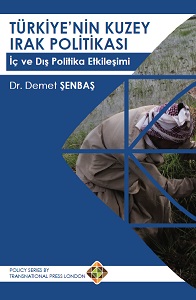
One of the most important security problems observed in the post-Cold War international system is ethnic conflicts and ethnic conflicts. Ethnic identity have become one of the most interested issues after the Cold War. Kurdish issue in Turkey as population characteristics reaching beyond the borders, was focused on the PKK being a terrorist group and democratisation issues and developments in northern Iraq, with an increasing focus on values such as the protection of human rights and minorities, have become an important foreign policy issue.
More...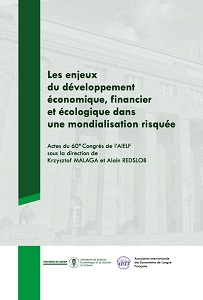
Proceedings of the 60th Congress of the International Association of French Language Economists. The volume contains 33 articles written by 47 French-speaking authors from around the world.
More...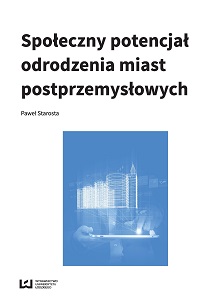
The book considers the evaluation of the significance of social potential in diversification of the development of postindustrial cities – cities that once used to serve similar functions, yet, nowadays function in different cultural conditionings. The analyses have been made on the basis of author’s concept of “social potential of territorial community development”. The work is dedicated to academics, to those interested in the local communities, especially of the postindustrial cities affected by the negative influence of globalization, as well as to activists in the field of urban issues.
More...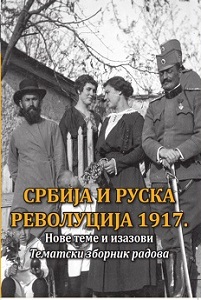
Две револуције на тлу Русије, фебруара и октобра 1917. Годи не имале су далекосежне последице на цео турбулентни 20. век. Русија неће бити творац и гарант мировних уговора после Првог светског рата, чиме ће нехотично охрабривати ревизионизме поражених или држава незадовољних новим поретком. Револуција и грађански рат унели су у европску свакодневицу појам „бољшевизам“, који постаје синоним за свако зло против кога се ваља борити свим средствима, па и у савезу са „црним ђаволом“. За Србију, то је била далекосежна промена тектонског карактера. Може се само нагађати да ли је била тежа неизвесност у току јулске кризе 1914. или губитак ослонца 1917. године. Прошло је сто година од тада. Руска револуција је као тема историчара крајем 20. века постепено маргинализована. Поистовећивана је са идеологизованим клишеом и постепено је подвргавана ништа мање идеологизованој ревизији или друштвеном забораву. [...]
More...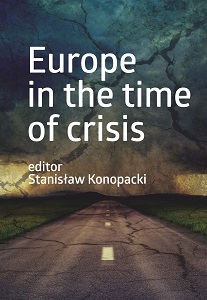
This volume, prepared in conjunction with the academic course European Integration at the Turn of the Twentieth and Twenty-first Century, features a collection of papers delivered during a series of lectures and seminars organized by the Faculty of International Studies and Political Science at the University of Lódz from 2011 to 2014. Some essays in the volume argue that the European Union is the most successful model of supranational governance since the rule of history's largest empires. Other works focus on various aspects of the European Union that have contributed to almost ten years of crisis.
More...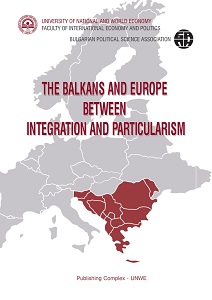
This volume is a collection of papers presented at the International conference THE BALKANS AND EUROPE BETWEEN INTEGRATION AND PARTICULARISM: CHALLENGES AND PROSPECTS, organized by the Faculty of International Economics and Politics at UNWE and the Bulgarian Political Science Association and held in Sofia on October 25-26, 2018. The conference invited presentations on a number of issues such as: The integration potential of the EU (28-1) and the “enlargement fatigue”; Ethno-politics and integration: dimensions, patterns and results in the EU and Western Balkans; The Bulgaria’s Presidency and the EU prospects of the Western Balkans; “Fatigued from waiting”: the countries of the Western Balkans; Bilateral relations in the Balkans: between historical mythology and pragmatism; Connectivity and cooperation in the Balkans: projects and realities, etc.Around fifty scholars and researchers – both established and younger ones – participated in the scientific forum representing a number of universities and research institutions from several countries (Bulgaria, Romania, Croatia, Northern Macedonia, Serbia, Kosovo, Russia). What is worth noting is the high rate of participation of doctoral students, as well as the contribution of undergraduate students from universities in Bulgaria and from MGIMO in Russia. Notably, some of the participants took part in the conference in absentia by poster presentations. The present volume contains the texts of those of the conference participants who sent their presentations in written form. The volume is structured in three parts except for the keynote speeches, which are presented separately as they were delivered during the Conference. The first part encompasses research papers dealing with issues pertinent to the whole European Union and various aspects of the integration processes. The focus in the second part is on the Balkans in the context of the EU integration. The papers in the third part deal with the Western Balkans in particular, featuring also case-studies on individual countries.
More...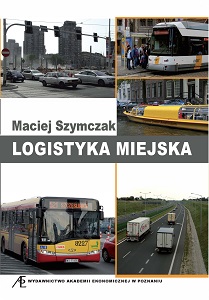
Logistyka miejska to nie tylko przepływy rzeczy i osób na obszarze miasta oraz składowanie zasobów wraz ze specyficznymi w organizmie miejskim uwarunkowaniami, ale kompletne systemy obsługi przemieszczeń zorientowane na usprawnienie aspektów ruchowych, podniesienie jakości życia i gospodarowania, ekologię, a w dalszej perspektywie – na rozwój miasta. Mówiąc o logistyce miejskiej, należy więc przede wszystkim eksponować wzajemne relacje między przepływami rzeczy i osób, między funkcjonowaniem łańcuchów dostaw a dziennym rytmem życiem miasta, należy skupiać się na możliwościach integracji różnych form transportu oraz wspólnego i efektywnego wykorzystywania zasobów. W rozdziale pierwszym, aby został określony zakres przestrzenny rozważań, dano krótki zarys wiedzy dotyczącej miast ze szczególnym uwzględnieniem procesu ich rozwoju. W rozdziale drugim wyjaśniono potrzebę wprowadzenia logistyki do miast, scharakteryzowano szczegółowo istotę, zakres i cel logistyki miejskiej, a także miejski system logistyczny. Dużo miejsca poświęcono zdefiniowaniu logistyki miejskiej i określeniu jej zakresu przedmiotowego. Rozdział zamykają rozważania dotyczące organizacji logistyki w systemie zarządzania miastem. Rozdział trzeci poświęcono w całości przewozom towarowym w mieście. Zwrócono w nim uwagę na łagodzenie konfliktów między przewozami towarów a przewozami osób w mieście, kształtowanie struktury gałęziowej przewozów towarowych poprzez administracyjne ograniczanie przewozów samochodowych na rzecz stosowania transportu szynowego pod konstrukcyjnie nowymi postaciami. Należną ekspozycję w tej części pracy znalazła też problematyka tranzytu towarowego przez miasto. Czwarty rozdział traktuje o kooperacji operatorów TSL w aspekcie zadań składowania dóbr i tworzenia miejskich centrów logistycznych. Kolejne dwa rozdziały poświęcono przewozom osób w mieście: zbiorowym przewozom osób, integrowaniu systemów transportu zbiorowego zarówno w granicach administracyjnych miasta, jak i w aglomeracji oraz reperkusjom, jakie powoduje gwałtowny rozwój motoryzacji indywidualnej w połączeniu z wciąż rosnącymi potrzebami społecznymi w zakresie indywidualnego przemieszczania się. W zamykającym pracę rozdziale siódmym znalazło się miejsce na przedstawienie aktualnych możliwości wykorzystania technologii informatycznych i telematyki w logistyce miejskiej oraz wyznaczenie ścieżek rozwoju w tej dziedzinie. Monografia powinna przede wszystkim zainteresować pracowników urzędów miejskich w miastach dużych i średniej wielkości, zwłaszcza odpowiedzialnych za transport, infrastrukturę i rozwój miasta. Praca powinna znaleźć odbiorców także pośród kadry zarządzającej spółek komunalnych, zwłaszcza organizatorów i realizatorów w miejskim transporcie zbiorowym. Celowe wydaje się, aby trafiła ona również do zarządzających przedsiębiorstwami z branży TSL i KEP oraz zarządzających dużymi przedsiębiorstwami przemysłowymi i handlowymi zlokalizowanymi w aglomeracjach miejskich. Warunkiem jednak jest pełna świadomość istoty tej koncepcji w szeregach kadry menedżerskiej. Niewątpliwie odbiorcami tej pracy będą studiujący zagadnienia urbanistyki, gospodarki przestrzennej, ekonomiki miast, zarządzania miastami, logistyki, transportu miejskiego.
More...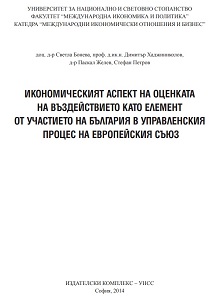
The purpose of this monograph is to present and analyse as completely as possible and with great level of detail the impact assessment tool and to examine its application in the European Union, including in Bulgaria. To achieve the aforementioned goals, the following research tasks have been completed: 1) An overview of the contemporary foreign and Bulgarian specialized economic literature in the impact assessment field has been conducted; 2) The main theoretical concepts of the impact assessment tool are reviewed and presented in their nature, objectives, scope, impact types and main principles for impact assessment application; 3) The main steps in an impact assessment preparation process are outlined; 4) A SWOT analysis is conducted on the main methods utilized in the impact assessment preparation; 5) The role of the various European institutions related to the impact assessment is analysed – European Commission, European Parliament, Council of the EU; 6) An indicative impact assessment of an EU legal act which will be transposed in Bulgaria has been prepared; 7) Constatations are outlined as well as conclusions and recommendations are formulated about the opportunities to improve the practices of impact assessment implementation in Bulgaria.
More...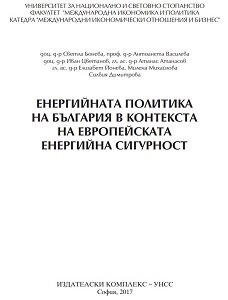
The main objective of this project is to conduct an in-depth analysis on the issues related to the Bulgarian energy policy in the context of the European energy security and the Bulgarian membership in the EU as well as to seek opportunities and formulate recommendations to overcome these challenges through expansion of the share of the renewable energy sources (RES) in the structure of the aggregated energy production and consumption on a country level, improvement of the energy efficiency of the economy, etc. To achieve these goals, we have completed the following research tasks: 1) An overview of the contemporary foreign and Bulgarian specialized economic literature in the relevant field has been conducted; analysis and summarization of the theoretical aspects of the energy security; 2) The main trends and approaches in the formation of the national energy policies have been studied and systematized (by the example of individual EU and non-EU countries - in this case Bulgaria's neighbours were chosen); 3) EU Energy policy evolution, priorities and instruments of this policy were analysed; 4) The Bulgarian energy policy in the context of the national energy security has been examined as well as programs, measures, perspectives to the energy policy. An analysis of Bulgaria's Energy Strategy until 2020 has been performed; 5) The legal framework of the Bulgarian energy sector and its compliance with European legislation as well as the national and European legal framework of energy security are specified; 6) Conclusions and recommendations have been formulated as a result of the present scientific research project.
More...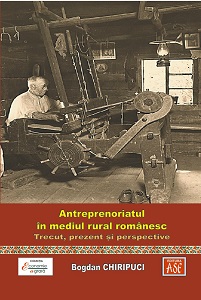
The research focused on identifying the impact of possible investments in all sectors of activity, but also on listing the measures which aimed the economic development of the romanian rural area in the period 2000-2020. In this regard, the sectors of activity which have registered the highest values of entrepreneurship in rural areas are: manufacturing, wholesale and retail trade; repair of motor vehicles and motorcycles, transport, storage, and construction. On the opposite side, the most disadvantaged areas in regards to possible investment in the rural areas have proven to be public administration and defense; social security in the public system, and also education. These sectors of activity are generally under the public coordination. At the core of economic activity there is a public-private partnership. Additionally, these variables would achieve a qualitative increase, if large investments were made in the future. Therefore, this would also lead to the development of other fields, being that currently there is no balance at national or regional level.
More...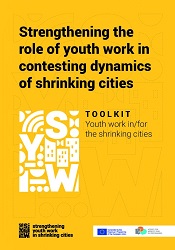
A great deal has been written about the causes and impacts of shrinkage, as well as about policies and planning strategies. Nevertheless, the state of knowledge in a cross-national perspective is rather poor since studies have focused more on large cities with empirical evidence ignoring the contextual influence on local dynamics (Wolff, Wiechmann; 2017). A shrinking city is one that has experienced population loss, employment decline and social issues as symptoms of a structural crisis (Martinez-Fernandez; 2012). This shows how complex the shrinkage process is and thus requires a more detailed explanation of push factors. The idea that there is no future prospect for them in their place of residence seems to be the crucial push factor for people to leave their home. This project has focused on building new strategies of social inclusion and civic engagement for youth residing in Europe’s “shrinking cities” and is a result of a collaboration between eight partner organizations from four EU countries: Documenta and Croatian Youth Network from Croatia, EJBW and Culture Goes Europe from Germany, YouthCoop and UMAR from Portugal as well as Asociacion Caminos and ColPolSoc - Andalucia from Spain. In the planning process, the partner organizations conducted a preliminary research and provided information about shrinking cities and their relation to the youth in their countries. There has been a unanimous conclusion that the socio-economic problems cause the cities to shrink which in turn has enormous effects mainly on the youth. On the other hand, there is a great number of young people who believe that they can make a difference and change things for the better. For this, the youth needs access to the commonly accepted tools and improved practices that can be used in their own social and cultural contexts. Therefore, youth work should provide a bridge that strengthens young people at a personal level but also promotes public action as well as learning about translating key values of youth work into reality. Moreover, engagement in the wide variety of personal and social development activities will help young people to develop the knowledge and the skills that are needed in the labour market, given the fact that 3.5 million young people are unemployed in the EU (Eurostat, 2018). The organizations embraced the idea of conducting proper research as well as mapping that would ensure a better understanding of the similarities and differences between various problems while at the same time providing methods for learning how to deal with critical socio-economic dynamics at different local settings across the EU. It was also deemed important to investigate examples of successful youth work, to identify and document their innovativeness and then disseminate the results with a wider outreach.
More...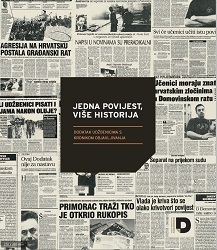
The Supplement to Textbooks of Current Croatian History is a handbook for history lectures, which was ordered by the Croatian Ministry of Science, Education, and Sports after the five-year moratorium on teaching current history in the Podunavlje region expired in the 2002/2003 school year. This easternmost region of Croatia remained under the control of local Serbs after the end of the 1991-1995 conflict, and was returned to Croatian sovereignty in 1998 after a transitory period under UN administration and the signing of an agreement between the Croatian government and the local Serb population. Part of the agreement included the decision that instruction in Podunavlje for Croat and Serb children would take place in separate classrooms, and that a five-year moratorium on teaching contemporary Croatian history in classes taught in the Serbian language would be imposed. At the end of 2002, the Ministry, headed by Minister Vladimir Strugar, in cooperation with the representatives of the Serb community and several history teachers, decided to form the „Commission for developing proposals regarding the teaching of history of the former Yugoslavia since 1989 in the schools of the Croatian Podunavlje,“ as well as produce a handbook which would cover the period of contemporary Croatian history after 1989. It was concluded that the handbook needed to function as an appendix for existing textbooks, and that it would serve as the first step in eliminating the moratorium and as a temporary solution until new textbooks could be chosen that would be translated into the Serbian language and script. After failing to find a publishing company to produce the handbook during 2003, work continued in the fall of 2004, under Minister Dragan Primorac. The Commission chose Tvrtko Jakovina and Snježana Koren from the Department of History at the Philosophy Faculty, University of Zagreb, as well as Magdalena Najbar-Agičić, the author and editor of a number of elementary and high school history textbooks, to complete the handbook. The authors finished the handbook in April 2005. In the meantime, the Commission decided that the text would not only serve the students in Podunavlje, but other students across all of Croatia as additional material for studying contemporary history. Once the work was completed, the manuscript was given to reviewers who needed to evaluate the quality of the methodology as well as the historical content of the material. However, before the reviews — some of which were subsequently shown to be very positive while others were extremely negative — reached the authors of the handbook, the content of the negative reviews appeared in the media and sparked a public debate that lasted for several months. The actual text of the Supplement remained, for the most part, inaccessible to the public, and the content of the Supplement, other than what was posted on the internet site of the Croatian Information Center without the authors’ knowledge or permission, was available only to those interested individuals who showed initiative and directly contacted the authors to see the material. Only a few of the journalists who were writing about this issue at the time actually did this. The situation which ensued was symptomatic for the mentioned time period in Croatia. The issue was overtly politicized, especially because this all occurred within the context of the tenth anniversary of the military-police action „Operation Storm.“ The authors were subjected to newspaper articles in which the Supplement was often described in an explicitly sensationalistic manner. Moreover, the authors were most often called out for allegedly relativizing wartime events, because for some media, politicians, and veterans’ organizations, the multi-perspective approach to teaching about the conflict developed in the Supplement was considered to be „a distortion of the historical truth about the Serbian aggression“ and „an attempt to equalize guilt for the war.“ A number of the reviewers recruited by the Ministry were also involved in this campaign against the authors. Already in the actual process of reviewing the material it was clear that some of the reviewers did not hesitate to stray outside of academic boundaries or resort to using primarily political disqualifications in their negative evaluations. In the course of the polemics raised over this issue, it also became evident that a number of the participants involved in the debate were not ready for thoroughly coming to terms with the past, nor did they support a systematic and academically based investigation of the recent historical events in Croatia. Despite the fact that in 2003 the Croatian Parliament approved the „Textbook Standard“ in which a number of conditions, formulated as „ethic requirements,“ needed to be met by textbooks in order to achieve certain universal values (which include raising students in a spirit of peace, tolerance, and democracy, and teaching them to respect racial, ethnic, cultural, and religious, differences, etc.), the debate over the Supplement revealed various and mutually exclusive concepts about the purpose and goals of history education, especially because of its potential role in shaping a student’s identity. Along with the fact that the universal values mentioned above are consistent with the educational policies of the European Union, there exist serious and deep-seated reasons in the past and present of this region why these values need to become an integral part of Croatian educational policies and practice. A second, specific framework of values that needs to be met by textbooks, according to the „Textbook Standard,“ is that Croatian textbooks must „nurture Croatian national identity“ and „encourage patriotic feelings towards the Republic of Croatia as a community of equal citizens, regardless of ethnicity or religious affiliation.“ The authors of the handbook unquestionably expressed a tendency to include elements from the first group of „ethic values“ mentioned in the „Textbook Standard,“ as well as to apply new methodologies in teaching history in which the students are transformed from passive recipients of information into active participants who draw their own conclusions. These goals in contemporary methodologies can be achieved by applying, among other strategies, a multi-perspective approach, which is a precondition for history education free of ideology. Ultimately, the debate influenced the Ministry of Science, Education, and Sports’ decision to not publish the Supplement. We believe that our decision to place the Supplement to Textbooks of Current Croatian History in our publishing program follows our goals and activities tied to encouraging the public to come to terms with the past and objectivizing recent Croatian history.
More...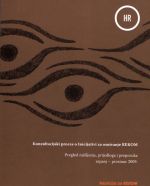
Konzultacije su organizirali Centar za građanske inicijative Poreč (Hrvatska) i Documenta (Hrvatska). Skupu je prisustvovalo 25 sudionika/ca iz organizacija za ljudska prava, udruga stradalih i obitelji nestalih, organizacija mladih, ženskih grupa, profesionalnih udruga i lokalnih vlasti u Istri. Amir Kulaglić iz Srebrenice (BiH), Vesna Teršelič (Documenta, Hrvatska) i Eugen Jakovčić (Documenta, Hrvatska) bili su predavači, dok su skup moderirali Bisera Momčinović (Centar za građanske inicijative Pula, Hrvatska) i Goran Božičević (MIRamiDA centar Grožnjan, Hrvatska). Radio Pula, Tv Nova izvještavali su sa događaja. Novi list i Glas Istre su objavili razgovor s Amirom Kulaglićem, autora Mladena Radića, kao i tekst „Prekinuti šutnju i poricanje“ autorice Tatjane Gromače.
More...